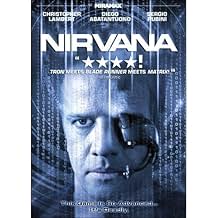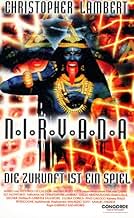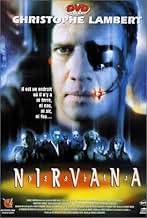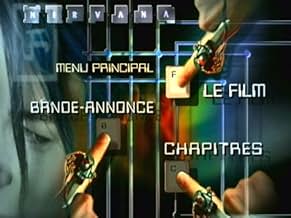Solo, el personaje principal de Nirvana, un juego de ordenador desarrollado por Jimi para lanzarlo en 3 días, ha ganado conciencia de sí mismo después del ataque de un virus. Solo quiere ser... Leer todoSolo, el personaje principal de Nirvana, un juego de ordenador desarrollado por Jimi para lanzarlo en 3 días, ha ganado conciencia de sí mismo después del ataque de un virus. Solo quiere ser eliminado. Jimi quiere encontrar a su ex.Solo, el personaje principal de Nirvana, un juego de ordenador desarrollado por Jimi para lanzarlo en 3 días, ha ganado conciencia de sí mismo después del ataque de un virus. Solo quiere ser eliminado. Jimi quiere encontrar a su ex.
- Dirección
- Guión
- Reparto principal
- Premios
- 5 premios y 20 nominaciones en total
- Lisa
- (as Emanuelle Seigner)
- Psicologo Okasama Starr
- (as Haruhiko Yamanouchi)
Reseñas destacadas
The title is not just the name of a videogame. That is totally incidental.
The movie is about the voyage towards Nirvana - the real thing - of two men (or maybe of one man and his own projection in a virtual world): how the two (or maybe the man and his own inner conscience) start to understand what Nirvana is and how they eventually reach it, in spite of all misadventures and (that is not casual at all...) the cycles of deaths and rebirths that the virtual self Solo (meaning alone, in Italian, not Star Wars' character - again not a coincidence) has to go through.
This is a movie about symbolisms. This is a movie about the deepest searches of the soul. Searches that cannot be disturbed by petty concerns (see Bebo Storti's apparently bizarre line after he appears in a flash for just a few seconds to shoot and kill a very unlucky henchman "I am MEDITATING [profanities deleted]!").
Science fiction is incidental to its aims, and provides a fabulously well used tool to unravel the story in what I regard as a cinematic masterpiece.
Blade Runner's climax ended on the recognition that replicants (and humans, maybe) were just "tears... in the rain". Nirvana's is about snowflakes that fall forever, and yet never fall.... Pity this is so far above the expectations of an average moviegoer that most viewers did not even recognize the genius in its simplicity. My congratulations to Cacucci, Corica and Salvatores!
It's not centered on the VFX, and it's great. Sometimes a bit slow, but it's for the "ambiance", and, what an ending... A must-see, not especially for Lambert-fans... Be open-minded, and try it...
The film has several things going for it. One is Christophe Lambert, who is always funny in any movie, no matter how bad it is. Another is the very beautiful Stefania Rocca, playing the mysterious Naima. The best thing, in my opinion, is that it is a truly Italian film, rather than a clone after an American movie, a feeling that is enforced by Diego Abatantuono playing the role of Solo in a typical Italian way. Other things, like the scene with the guy killing someone in the corridor because they were making too much noise 'ma che cazzo?!' or the car antitheft device spouting Italian insults are good examples.
The cyberpunk theme is clearly influenced by William Gibson's vision (I mean, what cyberpunk film isn't?), and in a way steals a lot of the elements you see in Johnny Mnemonic, released just two years earlier, but the moral of the story is more metaphysical in nature.
As much as I liked all of these elements in the film, I have to also complain about a lot of others. The low budget feel, the technicolor "virtual world", some of the clicheatic characters, etc. Overall I liked it, though, and I think for its budget, country of origin and ambitions, it was not a failure.
Jimi needs to penetrate Okasama's mainframe, and enlists the help of many technological wizards. Chief among them are Joystick, a poor hacker (or 'angel') who has sold his eyes to raise money and now sees with the aid of small black and white cameras in his eye sockets; and Naima, a woman whose memories have been erased and who can only remember things with the assistance of artificially created memories loaded through a port in her skull. The mainframe is protected by sophisticated anti-hacking devices known as 'devils' which feed off memories and mental energy to destroy the brains of the angels who try to penetrate it. Jimi is also battling painful memories of his own - his lost girlfriend who disappeared from his life leaving only a video recording and a picture to remind him of her...
Although there is not much in this film for action buffs, there is conceptually a link to other films about simulated experience such as Total Recall and The Matrix, as well as some existential musings on the nature of memory and experience in the digital age where such things can be easily synthesised. A delightfully ambiguous ending emphasises the film's main themes.
Good use is made of a medium budget to simulate an anarchic future world sliding into decay, with a decline in morality and a low value placed on the sanctity of life and the human body - the streets of the slums are replete with organ thieves; and Joystick's synthetic eyes are a physical complement to Naima's synthetic memories. A strong visual style is complemented by an insistent soundtrack.
8/10
¿Sabías que...?
- CuriosidadesThe movie was shot by an Italian crew in Italian and Lambert (who speaks only French and English in real life and who spoke all of his lines in these languages) was dubbed by an Italian actor. This is the movie's original Italian audio track. The movie was then dubbed fully in English (Lambert dubbed himself for this version, so the English audio track has his voice) for foreign markets. This is the movie's English dubbed audio track.
- Citas
Maria: Don't you like making love with me?
Solo: Well, yeah, of course, Maria; but, I mean: just be two electro-magnetic equations humping each other: don't mean to be distressing, but the procedure's in your head, but not, your sensations. It was Jimi who fed them in.
Maria: Mm; mmm; ok: So, who's this person, Jimi?
Solo: He's the guy that thought us up.
Maria: Oh.
- Créditos adicionalesThe last credit states as unintentional every reference to "person, things and trademarks".
- Versiones alternativasDuring 1997, shortly after it was released in Italy, Miramax's Dimension label dubbed Nirvana into English, in order to give it more mainstream appeal for the American market.
- ConexionesFeatured in Nothing is real - Appunti su Nirvana (1996)
Selecciones populares
- How long is Nirvana?Con tecnología de Alexa
Detalles
- Duración1 hora 53 minutos
- Color
- Mezcla de sonido
- Relación de aspecto
- 1.85 : 1
Contribuir a esta página



































